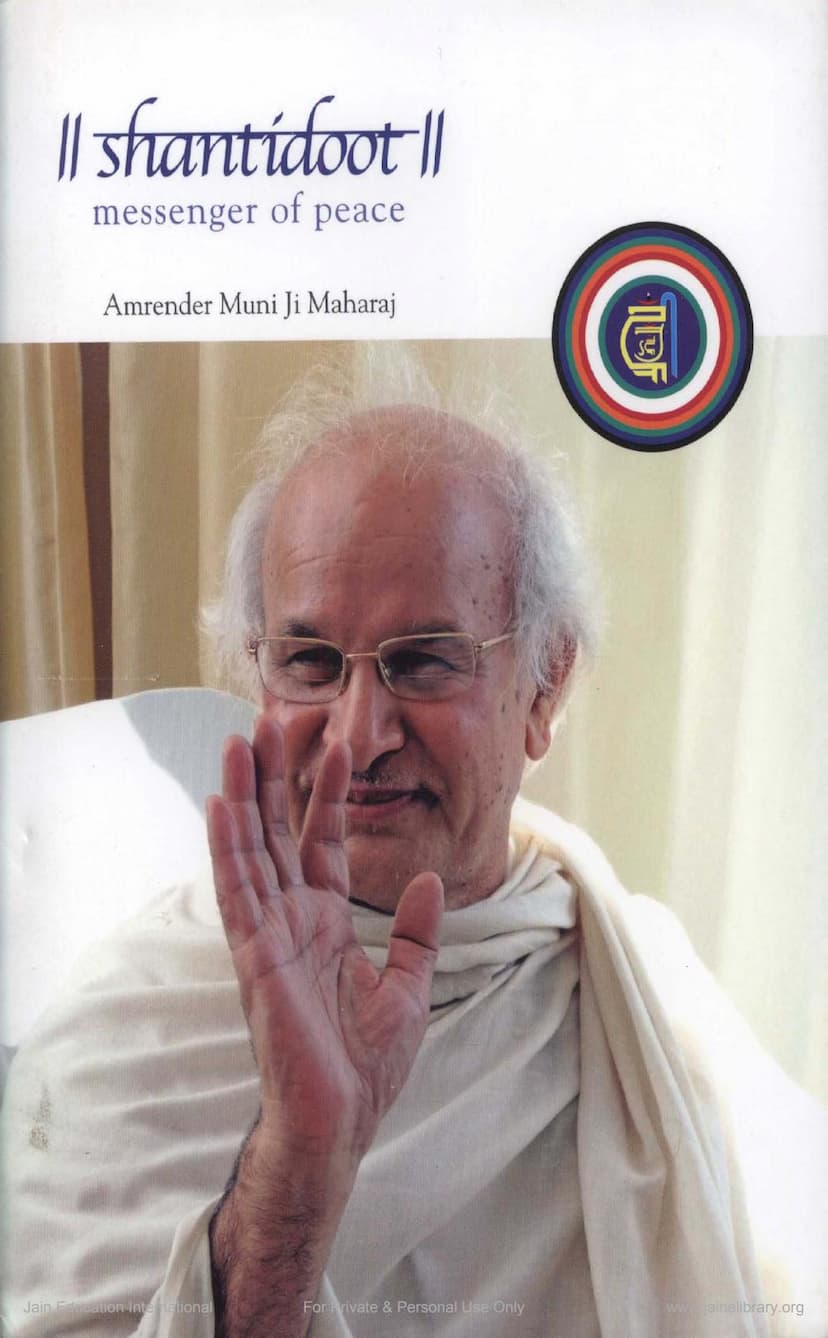Shantidoot Amrender Muniji
Added to library: September 2, 2025

Summary
This is a comprehensive summary of the book "Shantidoot Amrender Muniji" by Padmini Atal, published by Universal Ahimsa Foundation.
Book Title: Shantidoot Amrender Muniji Author: Padmini Atal Publisher: Universal Ahimsa Foundation
Overall Theme:
The book "Shantidoot Amrender Muniji" is a tribute to Acharya Amrender Muni Ji Maharaj, a Jain monk dedicated to promoting world peace, non-violence (Ahimsa), and tolerance. It chronicles his life, teachings, and extensive work in spreading the message of peace and humanity across India and internationally. The title "Shantidoot" means "Messenger of Peace," which accurately reflects his global mission.
Key Aspects of Acharya Amrender Muni Ji Maharaj's Life and Work:
-
Early Life and Spiritual Awakening:
- Born on April 12, 1949, named Amar.
- A barber prophetically warned his father that he was destined to become a monk.
- His spiritual journey began at a young age when he encountered the teachings and presence of Jain saints, particularly his Guru, Gurudev Shri Shukal Chand Ji Maharaj.
- He experienced profound spiritual awakenings and a strong detachment from worldly life, leading to his eventual initiation into monkhood.
-
Initiation and Monastic Life:
- Initiated as Amrender Muni on April 17, 1962, at the age of 14, taking vows of Ahimsa, Satya, Asteya, Brahmacharya, and Aparigraha.
- He was a favored disciple of Shri Shukal Chand Ji Maharaj.
- Later, he became a disciple of Acharya Sushil Kumar Ji Maharaj, who was the first Jain monk to travel abroad.
-
Global Mission of Peace and Ahimsa:
- Amrender Muni Ji Maharaj travels extensively, having visited over 46 countries.
- He addresses peace conferences and spreads the Jain principles of Ahinsa (non-violence), tolerance, and humanity.
- He has met with numerous world leaders, including President Clinton, Mikhail Gorbachev, and Indian Prime Ministers like Indira Gandhi and Manmohan Singh.
-
Teachings and Philosophy:
- Non-Violence (Ahimsa): This is central to his teachings, extending to thought, word, and deed, and encompasses compassion for all living beings, including plants and animals. He advocates for vegetarianism and the cessation of animal slaughter.
- Tolerance and Unity: He stresses the equality of all religions and the futility of religious sectarianism, promoting a message of universal brotherhood and treating the world as one family.
- Spiritual Practices: He emphasizes the importance of meditation (Dhyana), mantra repetition (Jap), and living a disciplined and simple life for spiritual growth and inner peace. He explains the science of mantras, their structure, and their impact on physical, mental, and spiritual well-being.
- The Namokar Mantra: The book extensively details the significance, structure, and benefits of the Namokar Mantra, considered the most important mantra in Jainism.
- Yama and Niyama: He aligns his teachings with the principles of Yoga, particularly Yama (restraints) and Niyama (observances), as outlined in Patanjali's Yoga Sutras.
- Humanitarianism: He advocates for service to humanity, particularly the poor and distressed, viewing it as a path to spiritual fulfillment.
- Importance of Values: He emphasizes simplicity, service, and self-reliance as essential components of a value-based life.
- Environmental Consciousness: He highlights the interconnectedness of all life and the importance of preserving the environment, noting the link between violence and natural calamities.
- Overcoming Obstacles: He teaches the importance of self-confidence, wise use of time, staying away from vices, and channeling emotions positively.
-
Key Organizations and Centers:
- Siddhachalam, New Jersey, USA: The first and only Jain pilgrimage center outside India, founded by Acharya Sushil Kumar Ji Maharaj and now under Amrender Muni Ji's patronage.
- Shukal Dham and Rohini Ashram in Delhi: Centers that provide spiritual guidance, medical services (Ayurvedic, Homeopathic), and educational support.
- He has initiated meditation groups in 40 countries.
-
Awards and Recognition:
- Conferred the title of "Shantidoot" (Messenger of Peace) by the Shankaracharyas in 1996.
- Received the Ahinsa Award, Avantika Award, and the first Lord Mahavir International Award, among others, for his contributions to peace and non-violence.
-
Major Influences:
- His primary influences were his Gurus: Gurudev Shri Shukal Chand Ji Maharaj and Acharya Sushil Kumar Ji Maharaj. The book details the profound impact they had on his life and spiritual development.
-
Devotee Experiences:
- The book includes numerous heartfelt testimonials from devotees around the world (Bahrain, USA, Muscat, Delhi) sharing personal experiences of Amrender Muni Ji's divine grace, healing powers, guidance, and the transformative effect of his presence and teachings. These accounts highlight miracles, profound spiritual insights, and the deep love and devotion he inspires.
-
Jainism: A Brief Outline:
- The book provides a concise overview of Jain philosophy, its core principles (Ahimsa, Satya, Asteya, Brahmacharya, Aparigraha, Anekant), the concept of the soul (Atma Tatva), the five supreme spiritual beings (Panch Parmeshthi), and the lives of the Tirthankaras (Lord Rishabhdev, Lord Parshwanath, Lord Mahavir). It also explains Jain rituals, festivals, and symbols.
Conclusion:
"Shantidoot Amrender Muniji" is an extensive compilation that portrays Acharya Amrender Muni Ji Maharaj as a global spiritual leader, a true "Messenger of Peace," whose life is dedicated to alleviating suffering and fostering harmony through the timeless principles of Jainism, particularly Ahimsa and tolerance. His teachings emphasize self-realization, compassion, and the interconnectedness of all beings. The book serves as an inspirational guide to his philosophy and the profound impact he has had on individuals and communities worldwide.